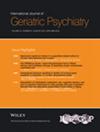Validity and Sensitivity to Change of a Self-Report Quality of Life Measure in Patients With Korsakoff's Syndrome
Abstract
Background
Assessing (self-reported) quality of life (QoL) in patients with Korsakoff's syndrome (KS) is important to gain insight into these patients' well-being and to optimize their care in long-term care facilities. In this study, we describe the development of the QUALIKO-Self Report (QUALIKO-SR), an instrument for objectifying self-reported QoL in patients with KS. Next, we compared the QUALIKO-SR scores with the scores on the QUALIKO-Proxy Version (QUALIKO-PV) and examined changes in QoL over time. Finally, we assessed the convergent validity and investigated whether QUALIKO-SR scores were related to the severity of the cognitive impairments.
Methods
The study took place in specialized long-term care facilities providing care for patients with KS. 116 patients with alcoholic KS participated in this study. The QUALIKO-SR was developed and validated against the QUALIKO-PV, the Manchester Short Assessment of Quality of Life (MANSA-16), and the Montreal Cognitive Assessment 8.1 (MoCA).
Results
Significant differences were found between self- and proxy reported QoL on the subscales Negative Affect, Social Isolation, and Feeling at Home. No significant differences were found on the other subscales. QUALIKO-SR scores did not significantly vary over time. However, caregivers reported significant improvements in Care Relationships, Autonomy, Restless Tense Behavior, Social Isolation, and Feeling at Home over time. A significant, positive association was found between the QUALIKO-SR and the MANSA-16. No significant correlations were found between the QUALIKO-SR and the MoCA.
Conclusions
This study describes the development and validation of a self-report instrument for objectifying QoL in patients with KS living in 24-h care facilities, the QUALIKO-SR. Measuring QoL in patients with severe cognitive impairments, such as patients with KS, is complex and we advise to include both self-report and proxy-report measures in future studies as well as in clinical practice. The availability of the QUALIKO-SR and QUALIKO-PV encourages researchers and clinicians to do so in patients with KS.

 求助内容:
求助内容: 应助结果提醒方式:
应助结果提醒方式:


